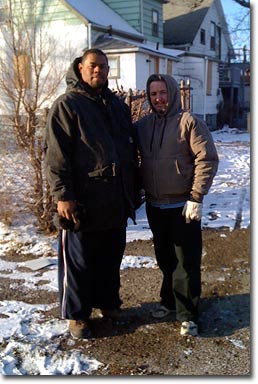Nicole Ross
Permaculture Research Institute of Australia
Whenever I mention I’m taking a trip back to Detroit, I always seem to get at least one “why would you go there?” To those unfamiliar with the City, the word “Detroit” often conjures up the negative image of a city gone wrong. Crime, poverty, blight, unemployment – all terms synonymous with Detroit’s reputation for so long. Fortunately, I’m here to inform you that Detroit’s image is undergoing a major makeover, thanks to people like Killian Obrien and Mark Covington. These are two amazing men who are working to bring positive change to one eastside neighborhood. Hope for Detroit also means hope for many other forgotten cities.
I was born into a Polish-Hungarian community on the South Side of Detroit, known as Delray. My great-grandparents made the area their home in the early 1900s. Most of my family continued to live and work in the close-knit community for many years. They were very self-sufficient. They planted food gardens, raised chickens and made their own beer to earn money. They had to be. They were poor.
Then, around 1960, like many others, my family slowly started migrating to bordering cities, such as Lincoln Park. I’m not exactly sure why they moved. But, what I most remember is that every few years more and more residents left. And, as more people left, the neighborhood slowly started to die.
The neighborhood I visited today, located on Georgia Street, off Gratiot, is not unlike Delray. To me, it seemed typical of many residential neighborhoods in Detroit proper; scattered vacant lots, abandoned houses with boarded up windows and many homes in need of repair. I could go on to further describe what many outsiders might even call a “ghetto”. But, to tell you the truth, I was so moved by the positive spirit of the people in the community I encountered, I didn’t see that. Instead, I saw hope. I guess it’s all about perspective.
What I saw was motivated people, with little resources, working together to bring about a positive change in their community. Instead of running, they were digging in, giving a damn and doing the dirty work that must be done – the work that most people refuse to face.
Much like my grandma Sophie from Delray, multi-generational resident Mark Covington has revived the idea of living self-sufficiently. Mark is not only growing his own food, but also raising chickens, right in Detroit. He also started a nonprofit called the Georgia Street Community Collective (GSCC). The GSCC started out as an effort to clean up forgotten vacant lots in his neighborhood. But, like a true Permaculturalist, Mark has turned a problem into a positive solution. With the help of volunteers and urban gardening organizations, he has transformed empty lots into an expanding array of community gardens. He continues to explore other creative options for revitalizing his neighborhood, including pairing up with up-and-coming Permaculture enthusiast, Killian Obrien.
Although he may not have the established reputation in the community that Mark Covington has, Killian Obrien is jumpin’ right in with both feet and eyes wide open. His goal is to start a sustainability education center right across the street from Mark’s family’s duplex. He has purchased a double lot, complete with a house that Mark’s grandma used to live in. He purchased the home just weeks ago, complete with numerous broken windows, holes in the walls, electrical and heating issues and a multitude of structural challenges. Yet, somehow, by diligently working around the clock, he has gotten it into decent enough shape to move his family in.
Killian hopes to completely revamp the house and lots into a model for urban sustainability that can be replicated by residents typical of the area. To help further this goal, he is working with the Permaculture Research Institute USA to set up an education program to offer Permaculture courses to teach people how to do this.
Both Mark and Killian are hoping to collaborate, and, together with other sustainable efforts in Detroit, plan to make a positive change to their city. One day soon, with dedicated community leaders like this, more and more local people will be inspired to move toward self-sufficiency and sustainability, changing the city’s rep from “a city gone wrong” to “a city leading the way into the future of urban sustainability”.
Subscribe to:
Post Comments (Atom)




0 comments:
Post a Comment